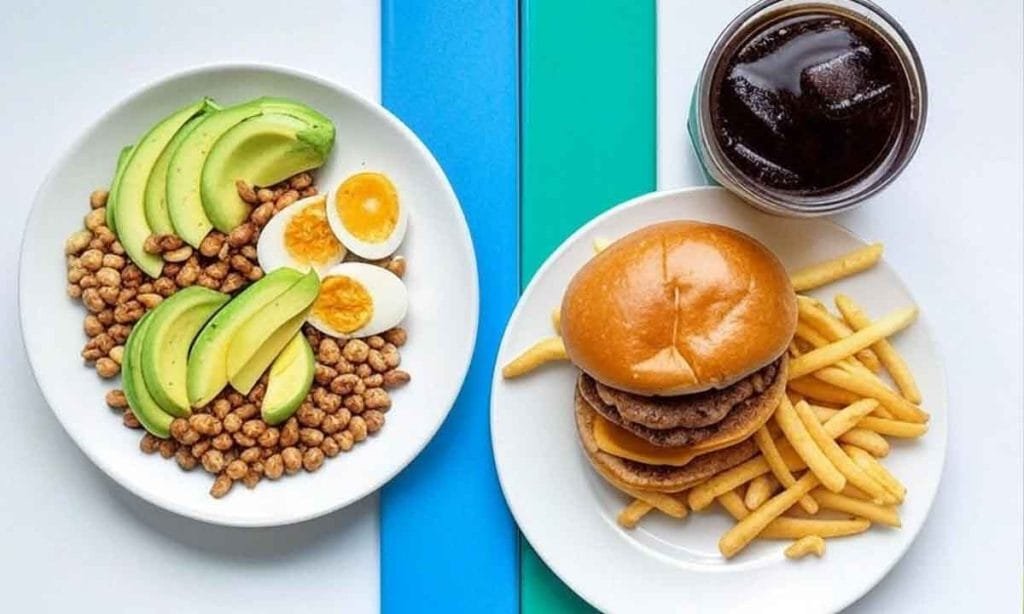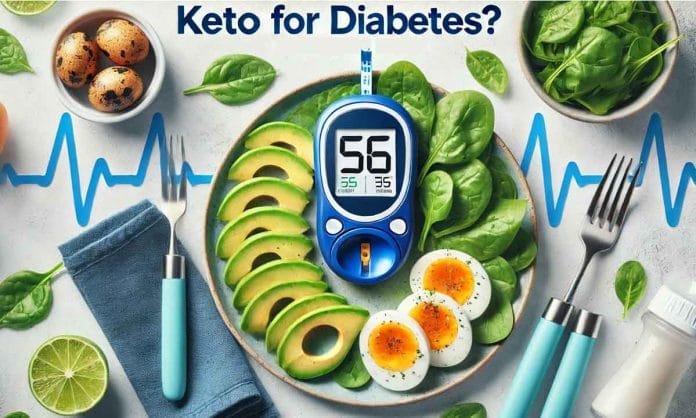Living with diabetes can feel like a constant balancing act—watching carbs, checking blood sugar, and juggling meds. If you’re asking, is a keto diet good for diabetics? You’re not alone. This low-carb, high-fat diet has sparked buzz for its potential to stabilize blood sugar and shed pounds. But is it a safe, effective choice for managing diabetes? As a medical expert, I’ve dug into the latest research, real-life stories, and expert advice to give you a clear, trustworthy answer. Let’s explore the pros, cons, and practical tips to see if keto could be your next step.
- What Exactly is a Keto Diet?
- Why Blood Sugar Matters for Diabetics
- Benefits of a Keto Diet for Diabetics
- 4. Heart Health Boost
- 5. Less Inflammation
- Risks to Watch Out For
- Real Stories: How Keto Works for Diabetics
- What Experts Say About Keto for Diabetics
- Keto vs. Standard American Diet: A Quick Comparison
- Tips for Starting Keto as a Diabetic
- Frequently Asked Questions About the Keto Diet and Diabetes
- 1. Is a keto diet good for diabetics with Type 1 diabetes?
- 2. Is a keto diet good for diabetics with Type 2 diabetes?
- 3. Can a keto diet reduce my diabetes medication needs?
- 4. What are the risks of a keto diet for diabetics?
- 5. How do I start a keto diet safely as a diabetic?
- 6. Will a keto diet help me lose weight if I have diabetes?
- 7. Is a keto diet good for diabetics long-term?
- 8. Can a keto diet cause nutrient deficiencies for diabetics?
- 9. How does a keto diet affect blood sugar control?
- 10. Where can I learn more about keto for diabetes?
- Conclusion: Is a Keto Diet Good for Diabetics?
What Exactly is a Keto Diet?
Imagine swapping your morning bagel for avocado and eggs. That’s the keto diet in a nutshell—a low-carb, high-fat way of eating that flips your body’s fuel source from carbs to fat. Here’s the breakdown:
- 70-80% fat: Think olive oil, nuts, butter, and cheese.
- 15-20% protein: Eggs, chicken, or salmon.
- 5-10% carbs: About 20-50 grams daily, mostly from veggies like kale or zucchini.
Compare that to the typical American diet, where carbs often hit 250-300 grams a day from bread, soda, and snacks. On keto, your body enters ketosis, burning fat for energy instead of glucose. For diabetics, this could mean fewer blood sugar spikes—but how does it really work?
Why Blood Sugar Matters for Diabetics

Whether you have Type 1 or Type 2 diabetes, blood sugar is the name of the game. In Type 1, your body doesn’t make insulin, the hormone that shuttles glucose into cells. In Type 2, your cells resist insulin, letting sugar build up in your blood. Left unchecked, high blood sugar can lead to heart disease, kidney issues, or nerve damage.
A keto diet slashes carbs, which directly cuts the glucose flooding your system. This can:
- Steady blood sugar: Fewer carbs mean fewer spikes.
- Lower insulin needs: Potentially reducing medication.
- Support weight loss: A big win for Type 2 diabetics.
But is a keto diet good for diabetics across the board? Let’s weigh the benefits first.
Benefits of a Keto Diet for Diabetics

The keto diet isn’t just a fad—it’s backed by science showing real perks for diabetes management. Here’s what you stand to gain:
1. Easier Weight Loss
Carrying extra weight fuels Type 2 diabetes by worsening insulin resistance. Keto helps by:
- Curbing cravings: High-fat foods keep you satisfied.
- Burning fat: Ketosis taps into your body’s fat stores.
A 2020 study in The Journal of Clinical Endocrinology & Metabolism found keto dieters lost more weight than those on low-fat diets, crucial for reducing diabetes complications.
2. Better Blood Sugar Control
Fewer carbs mean less glucose to manage. A 2018 Diabetes Care study showed that low-carb diets like keto lowered A1C levels (a key marker of long-term blood sugar) in Type 2 diabetics.
3. Improved Insulin Sensitivity
By reducing carb overload, keto can make your cells more responsive to insulin. Over time, this might mean less reliance on meds for Type 2 diabetics.
4. Heart Health Boost
Diabetics face higher risks of heart disease. Keto often lowers triglycerides and raises HDL (“good”) cholesterol, offering a heart-protective edge, per research from the American Heart Association.
5. Less Inflammation
Chronic inflammation drives diabetes complications. Keto’s focus on whole foods like avocados and nuts may reduce inflammation markers, supporting overall health.
These benefits sound great, but there’s another side to the story.
Risks to Watch Out For

Is a keto diet good for diabetics without risks? Not quite. While keto has potential, it’s not a magic fix. Here are the challenges to consider:
1. Hypoglycemia Danger
If you take insulin or blood sugar-lowering meds, cutting carbs too fast can tank your levels, causing hypoglycemia. Symptoms like dizziness or sweating can hit hard. Always adjust meds with your doctor.
2. Missing Key Nutrients
Keto limits fruits, grains, and beans—sources of fiber, vitamins, and minerals. You might fall short on:
- Fiber: Vital for digestion and blood sugar stability.
- Vitamins: Like vitamin C or B vitamins. Plan carefully with foods like spinach or consider supplements.
3. The Dreaded Keto Flu
Switching to keto can leave you tired, cranky, or foggy for a week or two. Drinking water and adding salt to meals can ease this transition.
4. Sticking with It
Keto’s strict rules can feel like a full-time job. Social dinners or cravings might derail you, potentially causing weight regain or blood sugar swings.
5. Kidney and Bone Concerns
High fat and protein could stress kidneys, a worry for diabetics with kidney risks. Some studies also suggest long-term keto might affect bone health.
So, how do real people fare on keto?
Real Stories: How Keto Works for Diabetics

Let’s hear from Americans who’ve tried keto for diabetes:
- Mark, 52, Type 2 Diabetic: Mark struggled with an A1C of 8.7% and extra weight. On keto, he lost 25 pounds in five months, dropping his A1C to 6.3%. “I feel sharper and lighter,” he says.
- Lisa, 38, Type 1 Diabetic: Lisa hoped keto would smooth her blood sugar swings. It helped initially, but frequent lows and meal planning stress led her to a less rigid low-carb diet.
These stories highlight keto’s potential—and its challenges. Your experience depends on your unique needs.
What Experts Say About Keto for Diabetics

Is a keto diet good for diabetics, according to the pros? Here’s the scoop:
- Dr. Sarah Hallberg, a diabetes specialist, says: “Keto can be a powerful tool for Type 2 diabetes, but it’s not a solo act. Work with your doctor to stay safe.”
- Emily Carter, RD, notes: “Every diabetic is different. Age, meds, and lifestyle shape how keto should look.”
The American Diabetes Association now supports low-carb diets for some diabetics but stresses personalized plans. The takeaway? Monitor blood sugar, tweak meds, and lean on experts.
Keto vs. Standard American Diet: A Quick Comparison

Wondering how keto stacks up? Here’s a snapshot:
| Factor | Keto Diet | Standard American Diet |
|---|---|---|
| Daily Carbs | 20-50g | 250-300g |
| Blood Sugar | Stable, fewer spikes | Frequent spikes |
| Weight Loss | Often faster | Slower, variable |
| Sustainability | Tough long-term | Easier but less effective |
| Nutrient Risks | Possible deficiencies | Balanced if whole foods |
This chart shows keto’s edge for blood sugar, but it’s not always easy to maintain.
Tips for Starting Keto as a Diabetic

Ready to try keto? Here’s how to do it safely:
- Consult Your Doctor: Get clearance and adjust meds.
- Work with a Dietitian: Build a nutrient-rich keto plan.
- Track Blood Sugar: Check levels often, especially at first.
- Start Slow: Ease into low carbs to avoid keto flu.
- Stay Hydrated: Drink water and add salt to meals.
A sample keto meal plan might look like:
- Breakfast: Scrambled eggs with spinach and avocado.
- Lunch: Grilled chicken salad with olive oil dressing.
- Dinner: Salmon with roasted broccoli and butter.
- Snack: A Handful of almonds or cheese cubes.
Frequently Asked Questions About the Keto Diet and Diabetes
1. Is a keto diet good for diabetics with Type 1 diabetes?
A keto diet can help stabilize blood sugar for Type 1 diabetics by reducing carbohydrate intake, but it’s not universally safe. The risk of hypoglycemia and ketoacidosis is higher, so close monitoring and medical supervision are essential. Consult your doctor to adjust insulin doses and ensure safety.
2. Is a keto diet good for diabetics with Type 2 diabetes?
Yes, for many Type 2 diabetics, a keto diet can improve blood sugar control, enhance insulin sensitivity, and promote weight loss. Studies, like those in Diabetes Care (2018), show lower A1C levels with low-carb diets. However, it’s crucial to work with a healthcare provider to avoid risks like nutrient deficiencies.
3. Can a keto diet reduce my diabetes medication needs?
Potentially, yes. By lowering blood sugar through reduced carb intake, a keto diet may decrease the need for insulin or other medications, especially for Type 2 diabetics. However, medication adjustments must be made under a doctor’s guidance to prevent hypoglycemia.
4. What are the risks of a keto diet for diabetics?
While is a keto diet good for diabetics is a common question, it comes with risks like:
Hypoglycemia: Especially if you’re on insulin or blood sugar-lowering meds.
Nutrient deficiencies: Limiting fruits and grains.
Keto flu: Temporary fatigue or irritability during the transition.
Kidney strain: Due to high fat and protein intake. Always consult a healthcare professional before starting.
5. How do I start a keto diet safely as a diabetic?
To safely explore if a keto diet is good for diabetics in your case:
Talk to your doctor to assess risks and adjust medications.
Work with a dietitian to plan nutrient-rich keto meals.
Monitor blood sugar frequently, especially in the first weeks.
Ease into low carbs to minimize keto flu symptoms.
Stay hydrated and include electrolyte-rich foods like avocados.
6. Will a keto diet help me lose weight if I have diabetes?
Yes, a keto diet often promotes weight loss by reducing hunger and burning fat, which is especially beneficial for Type 2 diabetics. A 2020 study in The Journal of Clinical Endocrinology & Metabolism found keto dieters lost more weight than those on low-fat diets. Weight loss can improve insulin sensitivity and blood sugar control.
7. Is a keto diet good for diabetics long-term?
The long-term safety of keto for diabetics is less clear. While it can stabilize blood sugar and support weight loss, challenges like nutrient deficiencies, kidney strain, or difficulty sticking to the diet may arise. Regular check-ups and a tailored plan are key to sustaining benefits.
8. Can a keto diet cause nutrient deficiencies for diabetics?
Yes, by limiting fruits, grains, and legumes, a keto diet may lead to shortages in fiber, vitamins (like B and C), and minerals. To counter this, focus on nutrient-dense keto foods like leafy greens, nuts, and seeds, and consider supplements under medical advice.
9. How does a keto diet affect blood sugar control?
A keto diet reduces carbohydrate intake, leading to fewer blood sugar spikes and lower glucose levels. This can improve A1C levels and reduce insulin needs, as shown in American Diabetes Association research. However, careful monitoring is needed to avoid hypoglycemia.
10. Where can I learn more about keto for diabetes?
For reliable information on whether a keto diet is good for diabetics, check trusted sources like:
American Diabetes Association
National Institute of Diabetes and Digestive and Kidney Diseases
Your healthcare provider or a registered dietitian can provide personalized advice.
Conclusion: Is a Keto Diet Good for Diabetics?
So, is a keto diet good for diabetics? For many, it’s a powerful tool—helping with weight loss, blood sugar control, and even heart health. But it’s not perfect. Risks like hypoglycemia or nutrient gaps mean it’s not for everyone. The secret sauce? Personalization and medical guidance.
If keto sounds like a fit, take these steps:
- Talk to your healthcare team: Ensure it’s safe for you.
- Plan smart: Focus on nutrient-dense keto foods.
- Stay vigilant: Monitor your body’s response.
Diabetes doesn’t have to run the show. Could keto be your path to better health? Start the conversation with your doctor today and take charge!
Sources
- American Diabetes Association
- National Institute of Diabetes and Digestive and Kidney Diseases
- The Journal of Clinical Endocrinology & Metabolism
- Diabetes Care
- American Heart Association



